Our website is supported by our users and contains affiliate links. We get paid when you purchase or sign up for anything through those links. Read the full disclaimer for more information.
Last Updated on November 29, 2023 by Daniella
One of the reasons I was able to build multiple income streams and an online business on the side of my day job is because I am a 100% remote worker.
As much as the social media girlies online will try and make you believe that you have the same hours in a day as Beyonce, that’s nonsense. Commuting to work can take up a lot of your time. Let’s be realistic. Beyonce isn’t going to a 9 to 5 every day and your time versus Beyonce’s time probably looks very different.
It isn’t just you, you really have no time, and your time is just as valuable as your money. If you’re commuting for an hour every day, then you are spending 250 hours a year, on average, just driving around.
Enter, remote work. Remote work is the ultimate life hack. For your time, your energy, your mental health, and your wallet.
With a remote job, you don’t waste hours on commutes nor waste energy on toxic workers. With remote side hustles, you get a chance to add more income streams and build wealth in a way that works for your schedule and your lifestyle.
I’ve worked either hybrid remote or full-time remote at every company I’ve worked at since I graduated college back in 2011. I was able to negotiate a full-time remote work agreement at 2 of those jobs before my wife and I up and moved 2,100 miles across the country. It was the best decision I ever made.
This is how I did it.
Table of Contents
How to Negotiate for Remote Work At Your Current Job
Just like negotiating salary, you can negotiate for other benefits like remote work.
Chances are if you have a benefit at your job called “Flexwork”, “Workplace Flexibility”, or similar, or have other people at your company already working full-time remotely, then you have higher chances of being able to negotiate for a full-time remote work benefit (or at least a hybrid remote work agreement).
However if you don’t, then you should still try.
Make a Business Case for You to Work Remote
Negotiating anything at your job is a matter of what is best for both you and the company.
What is the company interested in? What’s best for THEIR business?
This is why I am going to ask you to illustrate how something you are negotiating for will have a positive business impact, meaning – will it profit the company in some way? We want to think about their return on investment for keeping you as an employee and allowing you to work remote.
First things first, your company is in it for themselves. Not you – them. So, you need to be in this for you, not them.
If you really thrive working remotely but the company you currently work for still doesn’t budge on remote work after you state your case, it’s time to move on. You have to do what is ultimately best for you.
While you’re researching your business case that you’ll make for why they should allow you to work remotely at all, request a meeting with your manager.
Scripts for Initiating The Conversation With Your Manager:
Just like there are salary negotiation scripts people use to help with negotiating, I created a few remote work negotiation scripts and proposal examples to help you out.
If in response to the company bringing everyone back into the office –
Boss: “We are asking employees to return back to the office, starting with 1 to 2 days a week.”
You: “Hello X, thank you for this information. I would like to schedule a 1 on 1 meeting to discuss this change in my role.”
If you are initiating the conversation independently –
You: “Hello X, I would like to schedule a 1 on 1 meeting to discuss flexible work opportunities in my role.”
5 Steps to Prepare for Your Remote Work Negotiation
The biggest difference that you will make in negotiating for remote work in your favor is how prepared you are for the discussion with your manager. Focus on how you’re going to persuade them into allowing you to work remote and how you can show them that this is good for them too.
Start with these steps and tweak as you see necessary for your specific type of job:
- Research the landscape in your industry and how remote work helps these workers and companies – Reddit and Twitter have gone completely remote and boosted productivity. You can use FlexJobs to pull data for how remote work has helped companies (you can even use data that is in favor of the environmental impacts as well).
- Look internally at your company at other teams and organizations that are doing remote work, how it’s going for them, and how it’s being managed so you can bring that data back to your manager as a proven business case.
- If your team has been remote for a while but are being asked to come back, gather any data from how your team worked during that remote period.
- If you’ve worked remotely for any previous jobs, present that data as well.
- Emphasize how this benefits the organization and company. Include how your job could be done better. Does it allow you to be more productive? Does it allow you to get your job done better while tending to certain needs in your life like living far away from the office, a sick family member, sick animals, children, etc? Do you need (or want) to move for a spouse’s job change? These are all themes to keep in mind when you’re making your pitch.
- Create a plan and meeting for your request once you have enough measurable data to share with your manager. Search for data to show your past work as an employee such as results from past projects and testimonials from coworkers.
- Prepare all the materials for your meeting and be results driven in your presentation. Be as accommodating as you can with your ask, such as offering to create a detailed remote work plan so you’re on the same page about expectations. You will see this in action in the sample remote work proposal further down in this article.
- Expect some pushback but hold your ground as much as you can. Propose a trial period if they are interested.
- Build trust in the trial period with prompt communication, flexibility, and staying 1 step ahead by sending weekly statuses of your projects.
- Your trial period could start with negotiating 1 to 2 days a week working from home. After a couple of months you can regroup and discuss the switch to fully remote.
Above all else, make a case for how you working remotely actually makes their job easier and/or is a benefit for the company. Is there a morning meeting that you will be available for now that you work from home and don’t have to be unavailable in traffic? You can work these kind of things into your proposal to show the full scope of your request.
Creating Your Remote Work Proposal
Your proposal for remote work will most likely be a verbal one unless your manager asks for a typed proposal. Regardless of the medium in which your discussion occurs, always send the typed version as well to keep a paper trail. You can use the below format and use it for both.
Insert your own words anywhere you see [brackets]:
Introduce your pitch:
“Thank you so much for taking the time to meet with me today to discuss my role.
I have been with the company for [x years] and enjoy working for [company name]. I love the culture, people, and the work I’m doing. Due to recent life changes, I am proposing a flex work schedule to work remotely for [insert amount of days a week or state full-time remote].”
Only elaborate on specific reasons why you want to work remotely if they ask. If you need to negotiate this work arrangement due to moving (even if you are just planning a move, have this negotiation conversation before that and don’t elaborate on details unless they ask), a family commitment, or health related issue, then please include those reasons and the details that are important.
Present supporting evidence of work performance showing that remote work is the best option for you and the company and any other supporting evidence like other teams at the company doing remote work successfully.
Then continue on with any necessary discussion that will occur. Offer to do a trial period and offer to write out a detailed work from home arrangement to set expectations that you both can review and formally sign off on. There may also be some paperwork you will have to do with Human Resources.
If they have to go back and get additional approvals, patiently wait and continue to hold your ground.
Go from there. If they shut down your pitch, hold up your negotiation with 1 or 2 days remote or any other conditions you’d like to negotiate for like salary, more PTO, other flex work benefits like a 4 day work week, “work from anywhere” weeks, etc.
Do whatever you can to make your work experience fit your needs but if they continue to shut you down then it might be time to start looking elsewhere for a role that better fits you.
Sample Remote Work Proposal
First, write up your proposal before your 1 on 1 meeting with your manager. Bring up the idea and use your email writeup as a reference during the initial discussion. Then email the proposal for your follow-up.
Please tweak the verbiage as you see fit to fit your own style of writing/talking.
Hi [Manager’s Name],
Thank you so much for taking the time to meet with me today to discuss my role.
I have been with the company for [x years] and enjoy working for [company name]. I love the culture, people, and the work I’m doing. Due to recent life changes, I am proposing a flex work schedule to work remotely for [insert amount of days a week or state full-time remote].
During my time with the company, I’ve made many valuable contributions like [description of things you did, projects you worked on, results you’ve yielded]. Recently, I’ve also [description of something to help show your work stands out and you’re ready to be trusted in a more independent role]. I am proud of the work I do and will continue to do.
I’d like to propose an alternative working style that works well for me and that I think will also work well for this team and company. I believe I am more productive when working remotely and it will give me some additional flexibility I need to [insert life change here like taking care of a sick family member, an upcoming move, to avoid a long and time wasting commute, etc]. It also gives me a few extra hours each day to attend [insert name of meeting] that will help unload some duties off your shoulders as well.
I am extremely interested in the world of remote work and its place within my own career growth. Remote work skills are in high demand of some of the top fortune 500 companies out there and are projected to be rising in demand. If I don’t explore it at this stage in my career, I feel like I might be missing a huge opportunity for the future of my career.
I think working remotely will also benefit the company in several ways. [Team x] and [Team y] at our company are currently testing out remote work agreements as well and have shown an increase of morale and productivity because of it.
Without me having to be in the office, a new desk can be made available for another coworker or newly onboarded employee. The company will also save money on funding an extra body in the office as I will be using my own electricity and wifi to perform my work. Our current workstreams shouldn’t be affected as I will continue to use all the same tools we use in our day to day work for communication like Microsoft Teams and will continue to make my calendar times shareable.
Please consider my request; I am confident we can make it work. To keep me accountable, we can both discuss and agree on a specific remote work plan going forward to set expectations on things like working hours, communication standards, etc. This can help us stay in sync during this change and ensure success moving forward.
Thank you for your time and consideration. I’m looking forward to discussing this further with you.
[Sincerely,]
[Your Name]
Negotiating for Remote Work at New Jobs
When you’re applying for jobs and one of your “must have” benefits is remote work, then start your remote job search with remote-first companies. This will help ensure you get a remote job and then you can focus your negotiating power on other needs like a higher income, vacation time, stock options, you name it.
However, if you receive an inquiry to interview for a job when you aren’t quite sure about their remote work policies, bring it up in the phone conversations you have with them. Simply ask them what their policy is on remote work and would it be possible for you to work fully remotely? This will help you see if they’re a good fit for you or not.
If you’ve already received the job offer and they weren’t clear about remote work upfront, this is what you’re going to say:
Thank you so much, this is wonderful news and I am so excited about this opportunity! I would like to follow up on a couple of details though. How flexible are you with remote work benefits? The written job offer included ‘work from home days’, but I would like to discuss a full-time remote work agreement.
or:
Thank you so much! This is wonderful news & I’m excited to work with the team! I did have some questions concerning compensation and work arrangements. The offer is much lower than my market rate and based on my skills, experience and market salary for this position, I’d be eager to accept a salary of [$X] for this position with a fully remote work arrangement.
Again, hold your ground and keep your mouth shut until they have a response.
Additional Notes
You might need to be very careful with the timing of your remote work ask.
For example: Make sure your track record of being remote shows a good story. Have you been easily reachable and have prompt attendance in meetings? Can you manager still depend on you when working remotely?
Have you been able to remain productive, increase productivity, or even get more work and projects done that you wouldn’t have before with a rigorous commute schedule?
Are there measurable ways that you can show this to your manager? Are there trackable metrics you can share with them? Anything you can dig up that shows a good example of your past work will help your case.
All of these are important to keep in mind for how you’ll frame your request.
It’s time to start crafting your plan! Go out into the world and report back with your results – message or tag us on IG.
Here’s to being location independent 🌍🥂🎉
Continue your mission for remote work with these related articles:
- How to Spot Work From Home Scams
- FlexJobs Review: Is It Worth The Price?
- LGBTQ+ Friendly Companies to Add to Your Job Search
- Why Working From The Road Will Change Your Life
Pin it for later!


Daniella is the creator and author of iliketodabble.com. When their wife Alexandra and them aren’t globetrotting or playing with their 7+ animals, they are dabbling and working towards a future of financial freedom.

